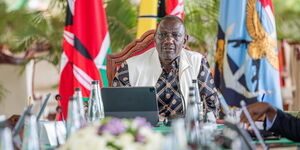The government's declaration of a nationwide dusk-to-dawn curfew is turning out to be a double-edged sword. While it was meant to help lower the rate of COVID-19 infections among Kenyans, emergency medical services for pregnant women have taken a hit.
An assessment by the Ministry of Health revealed that stillbirths have considerably increased after President Uhuru Kenyatta ordered the dusk-to-dawn curfew.
On Thursday, May 21, acting Health Director-General Dr. Patrick Amoth stated that the number of stillbirths in quarter one of 2020 had doubled.
"Either health-seeking is zero (because of curfew and restricted movements) or services at the facilities are not good," Amoth stated.
Since the first Covid-19 case was recorded in Kenya on March 13, 2020, the government has set stringent measures to combat the spread of the disease.
From the dusk to dawn curfews to cessation of movement in the Nairobi Metropolitan areas, Kilifi and Mombasa, the government has gone to great lengths to contain the disease.
Some of these measures, however, have had dire effects on soon-to-be mothers who have been are now facing harsh realities such as curfews and overwhelmed health care workers, whose efforts are geared more towards containment of coronavirus.
In a letter dated March 26, 2020, the Health DG wrote to all County Executive Committee Members of Health, asking them to suspend all elective surgical procedures in their facilities.
The DG stated that all available sources would be directed towards combating the spread and prepare for intensive management of patients who needed critical care.
"This would require use of the available human and material resources at your disposal that will be quite rigorous," read the letter in part.
On Sunday, May 10, United Nations Children's Fund (UNICEF) warned that containment measures could disrupt life-saving health services such as childbirth care, putting millions of pregnant mothers and their babies at great risk.
"They must prepare to bring a life into the world as it has become – a world where expecting mothers are afraid to go to health centres for fear of getting infected or missing out on emergency care due to strained health services and lockdowns,” stated Henrietta Fore, UNICEF Executive Director during Mother's day.
Speaking to Kenyans.co.ke, Mount Kenya University Head of Public Health, Ruth Mbugua, stated that health care workers were worried as the number of women who were seeking antenatal and postnatal care both for the mother and the newborn, were very few.
"The number of those going to hospitals for these services has reduced and this is worrisome as it could pose a danger to both mother and daughter," she told this writer.
Kenyans have been found to keep off hospitals in the wake of Covid-19.
Health County Executive Kariuki Gichuki previously stated that many Kenyans could be silently suffering from home, adding that others may be self-medicating, which is not advised.












